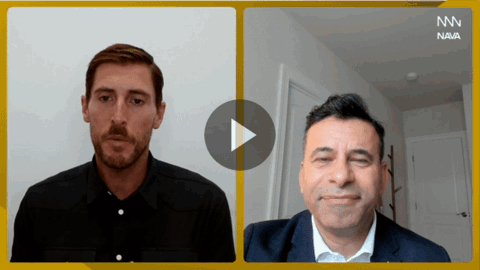October Covid Update: Five Things Business Leaders Should Know from Dr. Marty Makary

As employers continue to navigate the COVID-19 pandemic, Nava Benefits’ Chief Medical Advisor and health policy expert Dr. Marty Makary weighs in on the state of the pandemic and its impacts on the workplace as of October 2021 — from the expected peak of Delta variant cases, to antiviral drugs, to OSHA’s upcoming vaccine mandate.
As we continue our monthly Covid-19 update series, Nava's Chief Medical Advisor Dr. Marty Makary offers his expert perspective on the current state of the pandemic, the vaccine mandate, and the path forward. Read on for the five key takeaways, and watch the full video for more insights.

1. Most states have hit their peak in Delta cases — but we're not out of the woods just yet.
While we don't want to jinx it (knock on wood), we may have turned a corner in the spread of the Delta variant. In the month since we previously spoke with Dr. Makary, daily Covid cases have declined by almost 40% nationally.
"What we are seeing is a relatively symmetric epidemic curve," he explained, "which is sort of a boom-and-bust. That is a steady increase and a sharp decline. That's good news — we want this thing to be over with as soon as possible."
Dr. Makary estimates that the Delta variant peaked nationally in the second week of September. Still, considering just how large our country is, as well as the variation in vaccination rates state-by-state, some states may still see an increase in cases heading into flu season. While he predicts some further spread in northern states through December and January, the spike may be less severe due to high vaccination rates in that region.
The most promising news? "There's very few people left who have not had the virus or the vaccine... We can't assume it's gone, but we're headed to the endemic phase where we have to learn to live with this, and it's going to be downgraded from a serious public health threat to a seasonal virus."
2. Doctors may have discovered a new treatment option to stop the virus in its tracks.
In early October, Merck and Ridgeback Biotherapeutics shared early results indicating their experimental antiviral drug molnupiravir might significantly decrease the risk of death or hospitalization from Covid-19. The trials have been promising, and if they continue to yield positive results, it could be a game-changer for our nation's pandemic response.
"This drug is creating a lot of excitement," Dr. Makary told us. "It is a direct anti-viral medication.... This directly blocks the virus from replicating. It affects the machinery. For that reason, it can be used in combination with other therapies."
But we don't want to count our chickens before they hatch. The drug is still being studied and tested, so the jury's still out. As Dr. Makary pointed out, doctors thought similarly about Tamiflu, but that ended up not being an effective treatment.
The medication was just submitted to the FDA for emergency use authorization. If approved, it could be available as soon as early December.
3. Vaccine boosters can be effective in preventing infection among high-risk groups.
For people over 60 and other high-risk populations, the effectiveness of the Pfizer vaccine wanes over time, both in its ability to prevent a breakthrough infection as well as hospitalization. For that reason, these groups are encouraged to get a booster. Boosters have been proven to reduce the risk of hospitalization by tenfold.
It's important to note, however, that only the Pfizer vaccine has been approved for boosters at this point. More data is emerging on the effectiveness of Moderna vaccine boosters.
So what does this mean for employers? If your employee population includes a number of high-risk individuals (particularly age 60+), incorporate information on the booster into your communications on the vaccine. You may also consider taking note of boosters as part of your vaccination tracking initiatives.
4. Employers should consider beginning to prepare for the vaccine mandate to go into effect.
Last month, the Biden Administration announced that all employers with over 100 employees must confirm that all employees are either fully vaccinated or undergo weekly testing.
Although the Administration has not yet provided the timeline on when it will go into effect, Dr. Makary expressed confidence that the mandate will be carried out. The legality of the mandate has been called into question, but most independent lawyers have confirmed that the government does have the authority to enforce this policy.
Many large employers and government agencies have begun taking action to adapt to the mandate. Still, Dr. Makary encourages employers to remain accommodating and understanding of unvaccinated employees.
Employers can begin preparing for the vaccine mandate by developing and implementing a vaccination tracking program for their employee population. Because emerging evidence suggests that natural immunity from prior infection may provide a level of protection that's comparable to the vaccine, employers may consider also tracking immunity in addition to vaccinations; however, from what we currently know about the mandate, those with natural immunity will still be required to be vaccinated or undergo weekly testing.
5. Open enrollment is a key opportunity to encourage vaccination — but be thoughtful about your messaging.
"Hesitancy to the vaccine is really nothing new to us [doctors]," Dr. Makary emphasized, "And I can tell you, from a bedside standpoint, you win more bees with honey than fire. Right now, unfortunately, I think some people are being hardened to the idea of getting vaccinated, or even taking precautions that may be necessary at times... I think we would probably benefit from a more loving tone."
Tone is everything when it comes to encouraging vaccination. Consider taking a compassionate, understanding approach to your messaging.
Dr. Makary suggests that employers try sharing testimonials about the vaccine's effectiveness. "A patient came in and was intubated. Just before they were intubated, they asked for the vaccine. We told them, 'no, I'm sorry. At this point, it wouldn't help at all.' Sharing those testimonials, in my opinion, is pretty powerful in trying to encourage people to get vaccinated."
Watch the full interview with Dr. Marty Makary here:
Looking for more guidance? As your source for reliable, science-backed info, Nava will continue to provide regular Covid updates with all HR leaders need to know:
- The current state of the pandemic, according to Covid expert Dr. Makary and other members of our Nava Healthcare & Benefits Advisory Board
- Best practices for adapting and adhering to new vaccine mandates in the workplace
- Tips for communicating with employees through the pandemic and beyond
Register now to receive more updates from our team of industry experts:





.webp)
